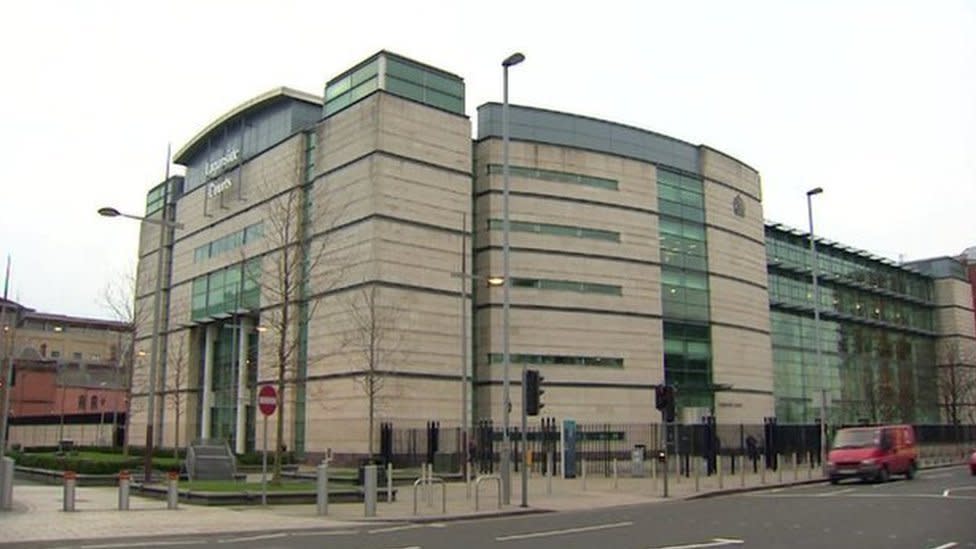Continuity IRA: Man cleared of terrorism charges over bugged meetings

A man has been acquitted of terrorism charges linked to bugged Continuity IRA meetings.
The 41-year-old had been on trial at Belfast Crown Court facing eight charges arising out of two meetings secretly recorded by MI5.
The meetings were held at a County Down house almost a decade ago.
Darren James Gleeson, originally from Dublin but with an address at Cable Street in Derry, was acquitted of all charges against him.
It was the prosecution case that Mr Gleeson travelled from his home in Dublin to Newry to attend the meetings with fellow dissidents at a house in Ardcarn Park in August and October 2014.
Seven other men who attended the meetings later admitted their presence at the bugged property, and in November 2020 all seven were sentenced to a total of 33 years on a range of terrorist offences.
Mr Gleeson denied all the charges against him, including IRA membership, conspiring to possess explosives with intent to endanger life, and the preparation of terrorist acts.
The non-jury trial started at Belfast Crown Court in October 2022, where it was alleged that Mr Gleeson attended the two Continuity IRA meetings.
Those present were recorded discussing topics such as the purchase of firearms, the best way to make bombs, earmarking potential targets and links with other dissident groups.
Crown barrister Ciaran Murphy KC told Mr Justice Colton the two meetings allegedly attended by Mr Gleeson in August and October 2014 were meetings of "like-minded individuals to discuss terrorism and moving their terrorist aspirations forward".
The prosecutor said it was the Crown's case that during the August 2014 meeting, Mr Gleeson and others were recorded discussing the IRA on both sides of the border.
Other topics discussed by the group and caught on the covert recording included discussing potential robberies to raise funds and the need for explosives training.
Dublin is discussed in one conversation, with a man the Crown say was Mr Gleeson being recorded as saying: "I will do whatever is necessary".
The man is told to try and locate a matchbox factory in Dublin as the group are interested in the sulphur used due to its explosive properties.
The man the Crown said was Mr Gleeson replied "I will do my best" and when he's also told to "try and recruit younger boys" in Dublin "before they get into drugs or the gangster scene", the man said said: "I will try."
The Crown alleged that Mr Gleeson attended a second meeting in October 2014, and again the occupants in Ardcarn Park were recorded discussing terrorist activity.
As well as talking about the best ways to transport bombs and attacking the PSNI, the men discussed planting an IED on the Belfast to Bangor railway line as it was "mainly Protestants''.
The prosecution said the evidence against Mr Gleeson was circumstantial but when all the strands of evidence were taken together, the court would be in no doubt that the defendant was present at Ardcarn Park on the relevant dates.
'Reasonable doubt as to his guilt'
In his ruling on Wednesday Mr Justice Colton said: "The prosecution must prove beyond a reasonable doubt that the defendant was present in Ardcarn Park on 12 August 2014 and 3 October 2014.
"The case against the defendant is a circumstantial one. That does not mean that it is a weak one.
"Self-evidently, the individual pieces of evidence identified do not establish the defendant was present at Ardcarn Park on the relevant dates so counts one to seven are not proven by direct evidence. I acquit the defendant on count eight (possessing records likely to be useful to committing an act of terrorism).
"I am not satisfied that the prosecution has proven to the requisite standard that the defendant was present at Ardcarn Park.
"I am not satisfied beyond a reasonable doubt that the defendant is guilty....the evidence in its totality leaves me with a reasonable doubt as to his guilt.
"The individual strands of evidence which I have analysed undoubtedly give rise to a high suspicion that the defendant was present, but they do not cross the line to establish guilt to the criminal standard.
"Accordingly, I acquit the defendant on all eight counts,'' added Mr Justice Colton.
Following the judgement, defence solicitor Mark Austin said outside court: "Mr Gleeson welcomes the judge's decision to acquit him on all counts.''

